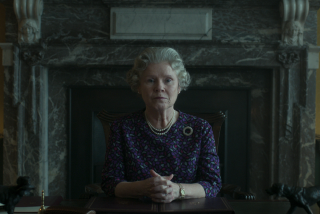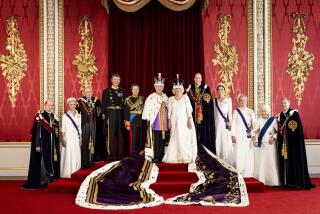Royalty? It’s un-American
- Share via
On a recent trip to Britain, what struck me most about that country’s relationship with its sovereign wasn’t the usual commercial tributes — the cheap china stamped with the queen’s likeness, the tabloid stories about the royal family and such rot — but the genuine devotion modern Britons seem to have for Elizabeth II. And judging by Americans’ fascination with events such as the recent royal wedding and the queen’s Diamond Jubilee celebration (a two-hour special on the jubilee hosted by Katie Couric on ABC attracted 6.4 million viewers and beat everything in its time slot except the NBA playoffs), it’s a feeling common on this side of the Atlantic as well. Which is a little ironic given that this nation sparked a bloody war against Britain by declaring eternal independence from such monarchs.
What if we hadn’t? Canada and Australia managed to become thriving independent democracies without going to war, and remain nominal subjects of the queen; Elizabeth’s image beams from their currency to prove it. But is there something in the American character that causes us to reject the idea of bowing to a hereditary monarch, or are we as hypnotized by the pomp and fantasy of royalty as our other fellow ex-colonists?
John Quincy Adams thought Americans were different. In fact, judging by a stirring Fourth of July address he delivered in 1821, he thought subservience to kings represented a fundamental flaw in the British character. Surveying their institutions during the height of the Reformation, the English had an opportunity to overthrow the monarchy — but they blew it, Adams asserted:
Britain “had been founded in conquest; it had been cemented in servitude; and so broken and molded had been the minds of this brave and intelligent people to their actual condition, that instead of solving civil society into its first elements in search of their rights, they looked back only to conquest as the origin of their liberties, and claimed their rights but as donations from their kings.”
From a modern context, that’s a bit harsh; the British people have stripped their queen of all but ceremonial powers. Yet they still, just as in Adams’ day, maintain the convenient fiction that governmental authority isn’t a natural right of the people but a royal favor. Under Britain’s constitutional monarchy, most governmental power flows from the queen, who maintains the prerogative to veto legislation, appoint the prime minister and direct the armed forces (she doesn’t actually do any of these things because more than a century of precedent forbids it).
The concept that a person is entitled to rule over another because of an accident of his or her birth is such a primitive notion that it’s hard to imagine why anyone in a post-Enlightenment society would embrace it. Adams thought the minds of the Britons had been “broken” by their history, but I suspect most of them today are simply caught up in the pageantry and romance of monarchy and don’t see it as a compelling threat to their own liberties. Yet ancient class-based prejudices forge fetters, and subjugation isn’t any sweeter when rulers reward it with a pleasant smile and a royal wave. Americans still owe a debt to the warriors and thinkers of 1776 for freeing us from all that.
— Dan Turner
More to Read
A cure for the common opinion
Get thought-provoking perspectives with our weekly newsletter.
You may occasionally receive promotional content from the Los Angeles Times.






